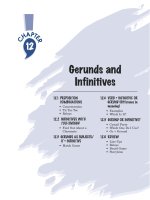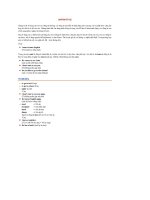Gerunds and Infinitives (Danh động từ và động từ nguyên mẫu)
Bạn đang xem bản rút gọn của tài liệu. Xem và tải ngay bản đầy đủ của tài liệu tại đây (54.36 KB, 2 trang )
Gerunds and Infinitives
Use:
1) A gerund is a verb in its –ing form, used as a noun.
For example: eating, going, seeing
Gerunds are used:
a) As the subject of a sentence.
Smoking is bad for you.
b) After some verbs, such as: like, hate, enjoy, quit, suggest, dislike, deny
I like cooking. I enjoy fishing.
A good learner’s dictionary will tell you whether a verb is followed by a gerund or not.
c) After prepositions.
I’m interested in buying a computer. I’m scared of walking alone in the dark.
2) The infinitive form of the verb is the original verb. It can be with or without ‘to’.
For example: (to) eat, (to) go, (to) see.
The infinitive form is used:
a) After some verbs, such as; agree, arrange, ask, promise, decide, afford
I agreed to do the work. I arranged to see the doctor, They decided to get married.
A good learner’s dictionary will tell you whether a verb is followed by an infinitive or not.
b) To show the reason why you did something.
Tony went to the post office to pay a bill.
c) After adjectives.
I was surprised to see Erica. I’m pleased to meet you.
3 a) Some verbs can be followed by a gerund or infinitive with NO CHANGE in meaning:
For example: start, begin, hate, like, prefer, continue
She started to cry = She started crying.
I hate watching horror films = I hate to watch horror films.
b) Some verbs can be followed by a gerund or a infinitive, but there is a change in meaning.
For example: try, remember, stop
I tried to get into the house. (Getting into the house is your goal or objective).
I tried climbing through the window. (Climbing through the window is one thing you tried
in order to obtain your final objective.)
I stopped cleaning the windows. (I was cleaning the windows and then I stopped).
I stopped to clean the windows. (I was driving, and I stopped driving in order to clean
the windows).
I remembered to lock the door. (I remembered, and after that I locked the door).
I remember locking the door. (I remember (now) that I locked the door (in the past)).









